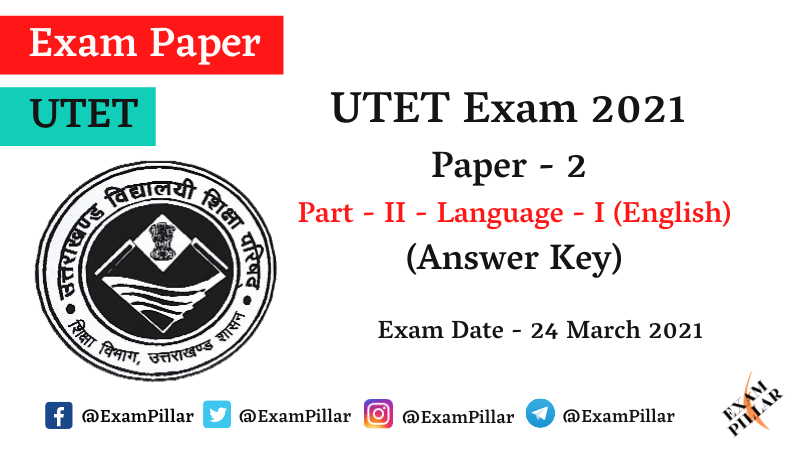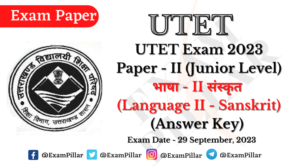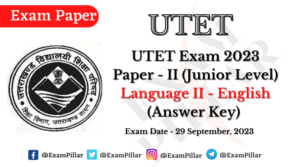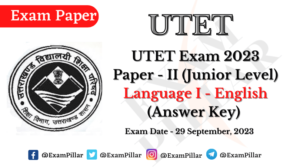उत्तराखंड विद्यालयी शिक्षा परिषद् (UBSE – Uttarakhand Board of School Education) द्वारा 24 मार्च 2021 को UTET (Uttarakhand Teachers Eligibility Test) की परीक्षा का आयोजन किया गया। UTET (Uttarakhand Teachers Eligibility Test) Exam 2021 Paper 2 – भाषा – I : अंग्रेजी की उत्तरकुंजी (Language – I : English) यहाँ पर उपलब्ध है।
UBSE (Uttarakhand Board of School Education) Conduct the UTET (Uttarakhand Teachers Eligibility Test) 2021 Exam held on 24 March 2021. Here UTET Paper 2 (Language – I : English) Paper with Official Answer Key.
UTET (Uttarakhand Teachers Eligibility Test) Junior Level
(Class 6 to Class 8)
Exam :− UTET (Uttarakhand Teachers Eligibility Test) Paper 2
Part :− भाषा – I : अंग्रेजी (Language – I : English)
Organized by :− UBSE
Number of Question :− 30
SET – D
Exam Date :– 24th March 2021
| UTET Junior Level Paper | Link |
| UTET Exam 2021 – Paper – 2 (Child Development and Pedagogy) | Click Here |
| UTET Exam 2021 – Paper – 2 (Language – I : Hindi) | Click Here |
| UTET Exam 2021 – Paper – 2 (Language – II : Hindi) | Click Here |
| UTET Exam 2021 – Paper – 2 (Language – I : English) | Click Here |
| UTET Exam 2021 – Paper – 2 (Language – II : English) | Click Here |
| UTET Exam 2021 – Paper – 2 (Social Studies/Other Subjects) | Click Here |
| UTET Exam 2021 – Paper – 2 (Mathematics and Science) | Click Here |
UTET Exam 2021 Paper – 2 (Junior Level)
भाग – II – भाषा – I : अंग्रेजी
(Part – II – Language – I : English)
31. What is the use of textbook in a class?
(A) to limit the course content
(B) to achieve learning objectives
(C) to explain ideas and concepts
(D) to make learning interesting
Show Answer/Hide
32. At the pre-primary stage reading aloud while writing is given importance. This is based on which theory of learning?
(A) Trial and Error
(B) Imitation
(C) Insight
(D) Conditioning
Show Answer/Hide
33. Noam Chomsky’s LAD is :
(A) Language Acquisition Device
(B) Language Adaptability Device
(C) Linguistic Acquisition Detector
(D) Linguistic Aptitude Detector
Show Answer/Hide
34. Select the incorrectly spelled word from the following:
(A) Diarrohea
(B) Embarrass
(C) Occasion
(D) Committee
Show Answer/Hide
35. Choose from the given options such sentences in which the use of preposition is incorrect :
(A) Send this letter to this address
(B) Put your signature in blue ink.
(C) Hard work is a key of success.
(D) She is short of money.
Show Answer/Hide
36. Complete the following sentence using the appropriate phrase preposition from the given option.
______ all his worries he keeps cheerful.
(A) In view of
(B) Owing to
(C) In spite of
(D) Instead of
Show Answer/Hide
37. Transform the following superlative sentence into a positive sentence.
Akbar was one of the greatest kings:
(A) Few kings were as great as Akbar.
(B) Few kings were great like Akbar
(C) Akbar was greater a king than anyone.
(D) No king was great like Akbar
Show Answer/Hide
38. The study of the formation of words is known as:
(A) Phonology
(B) Morphology
(C) Syntax
(D) Semantics
Show Answer/Hide
39. Which of the following methods of language learning and teaching is also known as the Berlitz method?
(A) The Audio-lingual method
(B) The Grammar translation method
(C) The Direct method
(D) The Communicative Language, Teaching
Show Answer/Hide
40. A sound formed by the combination of two vowels in a single syllable, in which the sound begins as one vowel and moves towards another, is known as:
(A) Diphthong
(B) Bilabial
(C) Penultimate syllable
(D) Intonation
Show Answer/Hide
41. Which of the following language skills may be considered as the consumption skills?
(A) Listening and reading
(B) Reading and writing
(C) Speaking and listening
(D) Writing and speaking
Show Answer/Hide
42. Select the option in which the punctuation mark is appropriately used.
Ashoka having conquered Kalinga began to hate war.
(A) Ashoka, having conquered Kalinga, began to hate war.
(B) Ashoka, having conquered, Kalinga began to hate war.
(C) Ashoka having conquered Kalinga, began to hate war.
(D) Ashoka, having conquered Kalinga began to hate, war.
Show Answer/Hide
43. Fill in the blank using the appropriate form of the italicized word.
The boy refused to allow anyone into his room. His ______ was misunderstood by those who didn’t know him :
(A) refusal
(B) refuse
(C) refusing
(D) both (A) & (B)
Show Answer/Hide
Direction (Q. No. 44 to 47): Read the passage given below and answer the questions that follow by selecting the most appropriate option.
There is nothing men desire more fervently than this mighty will. It may be the most selfish or unselfish of desires. We may long for it for its own sake or for the sake of some purpose that means more to us than praise. We are eager to escape from that continuous promises of humiliation of the promises we have made to ourselves and broken, It’s all very well to talk about being baffled to fight better, but that implies a will on the heroic scale. Most of us, as we see our resolutions fly out into the sun, only to “fall with broken wings before they have more than begun their journey, are inclined at times to relapse into despair. On the other hand, Nature is prodigal, and nothing so much as good resolutions. In spite of the experience of half a lifetime of failure, we can still draw upon her for these with the excitement of faith in our hearts. Perhaps there is some instinct for perfection in us which thus makes us deny our past and stride off into the future forgetful of our chains. It is the first step that counts, says the proverb. Alas! we know that is the step that nearly everybody can take. It is when we are about to take the steps that follow that our ankle feels the drag of old habit. For even for those of us who are richest in good resolutions are the creatures of habit just as the badly virtuous are. The only difference is that we are the slaves of old habits while they are the masters of new ones.
44. Why do we see our resolutions fly into the sun?
(A) Because we are the slaves of our old habits
(B) Because we follow others
(C) Because to err is human
(D) Because we set new resolutions
Show Answer/Hide
45. The given passage is about ______
(A) motivation
(B) health
(C) resolutions
(D) journey
Show Answer/Hide
46. The word ‘prodigal’, used in the passage, means :
(A) Prudent
(B) Perseverance
(C) Precious
(D) Generous
Show Answer/Hide
47. Which instinct in us makes us deny our past and march towards the future?
(A) Perfection
(B) Ambition
(C) Anxiety
(D) Guilt
Show Answer/Hide




